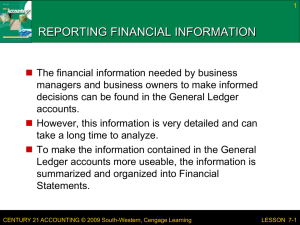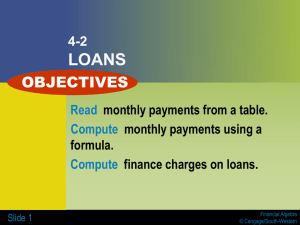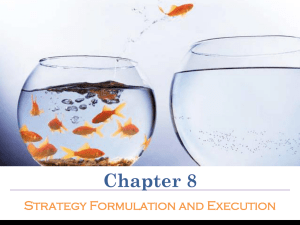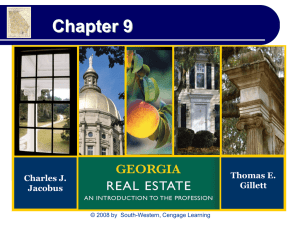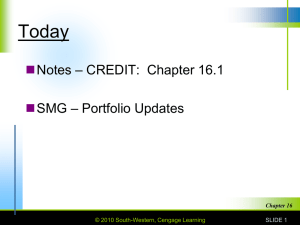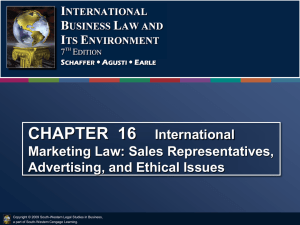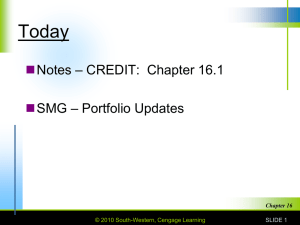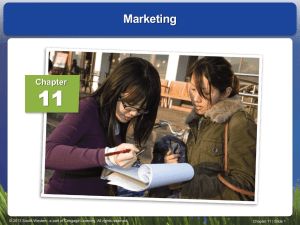CHAPTER 4 CHOOSE A CAREER Get a Job
advertisement
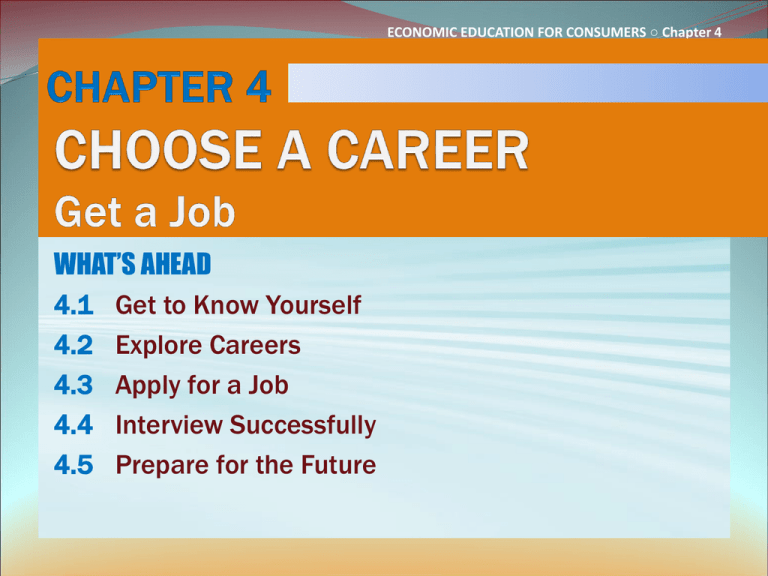
ECONOMIC EDUCATION FOR CONSUMERS ○ Chapter 4 WHAT’S AHEAD 4.1 Get to Know Yourself 4.2 Explore Careers 4.3 Apply for a Job 4.4 Interview Successfully 4.5 Prepare for the Future ECONOMIC EDUCATION FOR CONSUMERS ○ Chapter 4 LESSON 4.1 Get to Know Yourself GOALS ►Describe life and work values that you hold. ►Identify interests, aptitudes, and personality traits that will influence your career choice. Slide 2 © 2010 South-Western, Cengage Learning ECONOMIC EDUCATION FOR CONSUMERS ○ Chapter 4 KEY TERMS personal interest aptitude skill transferable skill personality Slide 3 © 2010 South-Western, Cengage Learning ECONOMIC EDUCATION FOR CONSUMERS ○ Chapter 4 KEY TERMS personal interest – activities that you find rewarding over an extended period of time. aptitude – a natural talent for learning some skills over others. skill – an aptitude developed through training and experience. transferable skill – a skill that allows you to complete specific tasks in various careers. personality – the blend of qualities that defines you as an individual. ECONOMIC EDUCATION FOR CONSUMERS ○ Chapter 4 What Do You Value? ►Life values – the most important principles in your life. For example…living near your relatives. ►Work values – principles that are most important to you in your work. For example…independence or creativity. Slide 5 © 2010 South-Western, Cengage Learning ECONOMIC EDUCATION FOR CONSUMERS ○ Chapter 4 Life and Work Values Income and wealth Creativity Security Personal growth Independence Family Physical risk Community Recognition Location Slide 6 © 2010 South-Western, Cengage Learning ECONOMIC EDUCATION FOR CONSUMERS ○ Chapter 4 Interests, Aptitudes, and Personality ►What are your interests? ►What are your aptitudes? ►Turn aptitudes into skills ►What is your personality? Slide 7 © 2010 South-Western, Cengage Learning ECONOMIC EDUCATION FOR CONSUMERS ○ Chapter 4 Common Aptitudes ►Verbal aptitude – the ability to write in a clear and interesting manner and to explain ideas so that others can understand them. ►Numerical aptitude – the ability to work with numbers quickly and accurately. ►Spatial aptitude – the ability to “see” what something will look like from a verbal description, a flat drawing or photograph. ►Manual dexterity – the ability to fix and build things and to do other physical work. ►Physical coordination – the ability to execute precise muscle movements. Slide 8 © 2010 South-Western, Cengage Learning ECONOMIC EDUCATION FOR CONSUMERS ○ Chapter 4 Personality Types ►Realistic ►Investigative ►Creative ►Social ►Enterprising Slide 9 © 2010 South-Western, Cengage Learning ECONOMIC EDUCATION FOR CONSUMERS ○ Chapter 4 How will the values you hold help you choose a career? What aptitudes and personality traits do you have that will help you choose your career goals? Slide 10 © 2010 South-Western, Cengage Learning ECONOMIC EDUCATION FOR CONSUMERS ○ Chapter 4 How will the values you hold help you choose a career? Values help people choose career goals by helping them realize what is important to them. Slide 11 © 2010 South-Western, Cengage Learning ECONOMIC EDUCATION FOR CONSUMERS ○ Chapter 4 What aptitudes and personality traits do you have that will help you choose your career goals? Ask yourself the following questions: • What activities do you find rewarding? • What natural talents do you have that help you learn certain skills? • Into what training and experience are you willing to put your efforts? • Do your goal choices fit with your personality? Slide 12 © 2010 South-Western, Cengage Learning ECONOMIC EDUCATION FOR CONSUMERS ○ Chapter 4 LESSON 4.2 Explore Careers GOALS ►Identify sources of career information. ►Describe steps you can take to plan for a successful career. Slide 13 © 2010 South-Western, Cengage Learning ECONOMIC EDUCATION FOR CONSUMERS ○ Chapter 4 KEY TERMS job career career connection Slide 14 © 2010 South-Western, Cengage Learning ECONOMIC EDUCATION FOR CONSUMERS ○ Chapter 4 KEY TERMS job – the set of tasks you accomplish as you work. career – an occupation to which you have made a long-term commitment. career connection – a meeting with someone who works in your career of choice. ECONOMIC EDUCATION FOR CONSUMERS ○ Chapter 4 Identifying Possible Careers ►Federal government sources of information ►Private sources of career information ►Career clusters ►Private employment agencies ►Make a career connection ►Be an intern ►Volunteer Slide 16 © 2010 South-Western, Cengage Learning ECONOMIC EDUCATION FOR CONSUMERS ○ Chapter 4 Federal Sources of Information ►Occupational Outlook Handbook (OOH) ►Occupational Information Network (O*NET) ►Occupational Outlook Quarterly ►Monthly Labor Review Slide 17 © 2010 South-Western, Cengage Learning ECONOMIC EDUCATION FOR CONSUMERS ○ Chapter 4 Career Clusters Agriculture, Food, and Natural Resources Architecture and Construction Arts, A/V Technology and Communications Business Management and Administration Education and Training Finance Government and Public Administration Health Science Slide 18 Hospitality and Tourism Human Services Information Technology Law, Public Safety, Corrections and Security Manufacturing Marketing Science, Technology, Engineering, and Mathematics Transportation, Distribution, and Logistics © 2010 South-Western, Cengage Learning ECONOMIC EDUCATION FOR CONSUMERS ○ Chapter 4 Plan Your Career ►Determine skills, training, and education required ►Consider your family ►Finance your plans Slide 19 © 2010 South-Western, Cengage Learning ECONOMIC EDUCATION FOR CONSUMERS ○ Chapter 4 What are several sources that may be used to gather career information? What steps should you take to create a realistic career plan? Slide 20 © 2010 South-Western, Cengage Learning ECONOMIC EDUCATION FOR CONSUMERS ○ Chapter 4 What are several sources that may be used to gather career information? • Check federal government sources including the Occupational Outlook Handbook and O*NET • Talk to people employed in specific careers to gain personal information, insights, and impressions • Meet with people in careers that are of interest (friends, family, job fairs, etc.) Slide 21 © 2010 South-Western, Cengage Learning ECONOMIC EDUCATION FOR CONSUMERS ○ Chapter 4 What steps should you take to create a realistic career plan? • Plan to acquire needed skills, training, and education • Consider how your family might be affected by your career choice • Arrange for methods of financing your preparation Slide 22 © 2010 South-Western, Cengage Learning ECONOMIC EDUCATION FOR CONSUMERS ○ Chapter 4 LESSON 4.3 Apply for a Job GOALS ►Identify ways to find out about job openings. ►Describe the job application process. Slide 23 © 2010 South-Western, Cengage Learning ECONOMIC EDUCATION FOR CONSUMERS ○ Chapter 4 KEY TERMS referral temporary agency résumé cover letter reference Slide 24 © 2010 South-Western, Cengage Learning ECONOMIC EDUCATION FOR CONSUMERS ○ Chapter 4 KEY TERMS referral – the recommendation of a person for a job given to an employer by someone the employer knows. temporary agency – a private company that specializes in supplying short-term employees to businesses. résumé – a brief summary of your job qualifications, including your education and training, job skills and work experience. cover letter – your letter of introduction. reference – a person the employer can contact to verify your training, experience or character. ECONOMIC EDUCATION FOR CONSUMERS ○ Chapter 4 Look for Job Openings ►People you know ►Potential employers ►Newspapers ►Employment agencies ►Temporary agencies ►Jobs online Slide 26 © 2010 South-Western, Cengage Learning ECONOMIC EDUCATION FOR CONSUMERS ○ Chapter 4 Application Process ►Preparing a résumé ►What to include? ►Writing a cover letter ►Completing the application ►References Slide 27 © 2010 South-Western, Cengage Learning ECONOMIC EDUCATION FOR CONSUMERS ○ Chapter 4 What steps can you take to identify job openings in your community? List and describe steps in the application process. Slide 28 © 2010 South-Western, Cengage Learning ECONOMIC EDUCATION FOR CONSUMERS ○ Chapter 4 What steps can you take to identify job openings in your community? Find out about local job openings by . . . • Asking friends and relatives • Checking newspapers • Performing Internet searches • Working with employment and temporary agencies Slide 29 © 2010 South-Western, Cengage Learning ECONOMIC EDUCATION FOR CONSUMERS ○ Chapter 4 List and describe steps in the application process. • Prepare a resume: a summary of your qualifications, education and training, and employment history as well as your contact information • Write a cover letter: explanation of the reason you are applying and how your services will benefit the employer • Complete the application: employment and personal information needed by the employer Slide 30 © 2010 South-Western, Cengage Learning ECONOMIC EDUCATION FOR CONSUMERS ○ Chapter 4 LESSON 4.4 Interview Successfully GOALS ►Describe how to prepare for an interview for a job. ►Write an interview follow-up letter. Slide 31 © 2010 South-Western, Cengage Learning ECONOMIC EDUCATION FOR CONSUMERS ○ Chapter 4 KEY TERM interview Slide 32 © 2010 South-Western, Cengage Learning ECONOMIC EDUCATION FOR CONSUMERS ○ Chapter 4 Pre-Interview Checklist ►Be on time ►Know your résumé ►Know the company ►Anticipate questions ►Complete a practice interview ►Prepare questions ►Dress for success Slide 33 © 2010 South-Western, Cengage Learning ECONOMIC EDUCATION FOR CONSUMERS ○ Chapter 4 In the Interview ►Be polite ►Be conscious of your nonverbal communication ►Try to make only positive remarks ►Let the interviewer lead the conversation ►Bring up your skills and experience ►Ask questions ►Let the interviewer know you would like the position ►Thank the interviewer Slide 34 © 2010 South-Western, Cengage Learning ECONOMIC EDUCATION FOR CONSUMERS ○ Chapter 4 What They Can’t Ask You ►The Equal Employment Opportunity Act of 1964 ►The Rehabilitation Act of 1973 ►Examples of inappropriate questions: ►Have you ever seen a therapist? ►Are you planning to have kids? ►What is your medical history? ►You’re a Christian, aren’t you? ►What country are your parents from? Slide 35 © 2010 South-Western, Cengage Learning ECONOMIC EDUCATION FOR CONSUMERS ○ Chapter 4 Write a Follow-Up Letter ►Provide your contact information ►Thank the interviewer ►Identify the position you are seeking ►Repeat your interest Slide 36 © 2010 South-Western, Cengage Learning ECONOMIC EDUCATION FOR CONSUMERS ○ Chapter 4 Describe how you should prepare for a job interview. What is the purpose of sending a follow-up letter after a job interview? Slide 37 © 2010 South-Western, Cengage Learning ECONOMIC EDUCATION FOR CONSUMERS ○ Chapter 4 Describe how you should prepare for a job interview. To prepare for a job interview you should: • Review your résumé and cover letter • Complete practice interviews • Dress appropriately • Arrive on time • Bring extra copies of your résumé Slide 38 © 2010 South-Western, Cengage Learning ECONOMIC EDUCATION FOR CONSUMERS ○ Chapter 4 What is the purpose of sending a follow-up letter after a job interview? The purpose of a follow-up letter is to remind an employer of your interest in the job. Slide 39 © 2010 South-Western, Cengage Learning ECONOMIC EDUCATION FOR CONSUMERS ○ Chapter 4 LESSON 4.5 Prepare for the Future GOAL ►Explain why it is important to fit in and perform your duties well when you begin a new job. Slide 40 © 2010 South-Western, Cengage Learning ECONOMIC EDUCATION FOR CONSUMERS ○ Chapter 4 KEY TERMS downsizing severance pay notice Slide 41 © 2010 South-Western, Cengage Learning ECONOMIC EDUCATION FOR CONSUMERS ○ Chapter 4 A Job Well Done ►Be a part of the team ►Take direction Slide 42 © 2010 South-Western, Cengage Learning ECONOMIC EDUCATION FOR CONSUMERS ○ Chapter 4 Know When It’s Time to Move On ►Changing careers ►Getting downsized ►Getting fired Slide 43 © 2010 South-Western, Cengage Learning ECONOMIC EDUCATION FOR CONSUMERS ○ Chapter 4 Leave on Good Terms ►Always be considerate of your current employer’s needs ►Give notice at least two weeks before you leave Slide 44 © 2010 South-Western, Cengage Learning ECONOMIC EDUCATION FOR CONSUMERS ○ Chapter 4 Be Prepared ►Update your resume ►Think about what you want for your next job ►Plan your finances Slide 45 © 2010 South-Western, Cengage Learning ECONOMIC EDUCATION FOR CONSUMERS ○ Chapter 4 Why should workers always try to fit in and try to do their best when they start new jobs? Slide 46 © 2010 South-Western, Cengage Learning ECONOMIC EDUCATION FOR CONSUMERS ○ Chapter 4 Why should workers always try to fit in and try to do their best when they start new jobs? Workers should try to fit in when they start a job because they need to learn from other employees. Slide 47 © 2010 South-Western, Cengage Learning
